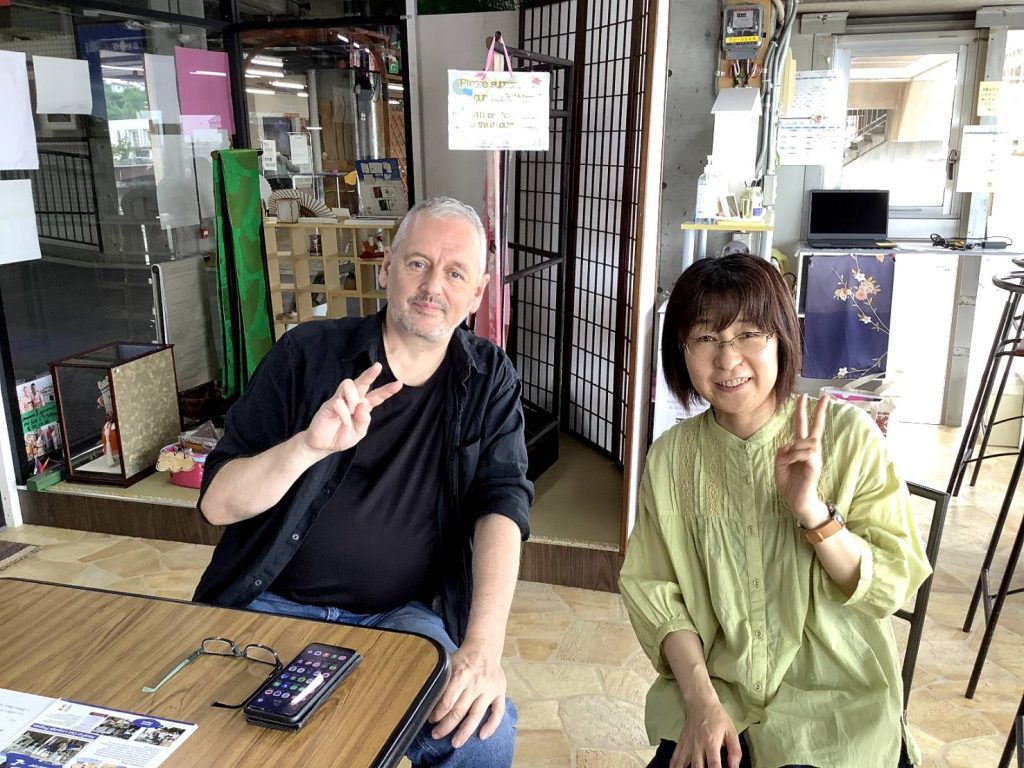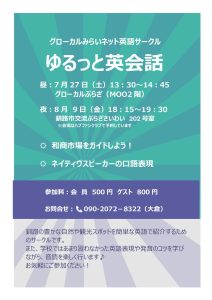🌻何とゆう偶然なんだろう!!!
What a coincident!
At our Glocal Plaza, we display items such as kimonos and Ainu embroidery, so we occasionally get visits from foreign tourists.
When I stopped by there, Miss Sakamoto, the instructor, was preparing the materials for an English study session. While we were
chatting and looking over the content, a man who seemed to be a foreign tourist arrived. As we went through the usual questions
about his hometown and travel itinerary, we learned that he was from the UK, now living in Australia, and currently enrolled in
a Japanese language school in the Kansai region. He also mentioned having experience teaching English in places like China.
No wonder he was so keenly examining the materials. With such a background, I thought there would be things I'd like to ask him,
so after inquiring about the origins of Australian English, I brought up something that had been on my mind for a while.
"In Japan, each kanji has its own meaning, and when parents name their children, they choose kanji hoping for their child's future.
But English letters don’t seem to have meanings, so how do parents choose names for their children?"
He replied that while the sound of the name is important, each English name does have an original meaning.
He went on to carefully explain the original meaning of the name Peter as an example.
It seemed he hadn't had many opportunities to talk with others during his long solo trip, as he answered our questions very eloquently,
and our conversation went on for so long that we lost track of time. He was also well-versed in Japanese pop culture and the films of Kurosawa and Ozu,
and we had an enthusiastic discussion about their works and the actors who appeared in them.
Given this, I explained the concept of "ichi-go ichi-e" (once-in-a-lifetime encounter,) as it is passed down in the spirit of the tea ceremony.
What left a strong impression on me was his discussion about the recent decline in safety in cities around the world.
It seemed that one of the reasons he was living comfortably in Japan was because of this. It’s understandable that the increasing number of foreign tourists
often mention cleanliness and safety as their impressions of Japan.
I tried to explain the Japanese mindset, but I'm not sure how much he understood with my limited English ability.
In any case, what a coincidence it was to meet an English researcher just before the English study session.
(Nezu’s Note)

******************

何という偶然なんだろう!
私達のグローカルプラザには着物やアイヌ刺繍などを陳列しているので、時たま外国人観光客が訪れる。
私がそこを立ち寄った時、英語の勉強会のために講師の阪本さんがテキストを準備していた。
その内容を見ながらしばらくおしゃべりをしていたら、外国人観光客とみられる男性が訪れた。
私たちは、型通り出身地や旅行日程など聞いていくうちに、彼がイギリス出身で今はオーストラリアに住み、
目下関西で日本語学校に在籍しているとの事。中国などで英語を教えた経験もあると言う。
どおりで熱心にテキストを見ていたのが頷けた。そのような経歴なら聞いてみたいことがあると思った
私はオーストラリア英語の原点などを尋ねた後、かねてから気になっていた事についてこのように切り出した。
「日本の漢字はそれぞれ意味を持っており、親が子供に名前を付ける時、その子の将来を期待して漢字を選ぶのだが、
英語の文字には意味があると思えず親たちはどのように子供に名前を付けるのだろう?」
彼は親が名前を付ける時その名前の響きもあるが、英語の文字は本来それぞれの名前は意味持っているという答えだった。
続けて彼はPeterと言う名を例にとって、その本来も意味を丁寧に説明してくれたのだった。
彼も長い間の一人旅で他人と話す機会が無かったと見え、実に雄弁に私たちの質問に答えてくれ、
時間を忘れるほど長きにわたった。
彼は日本のポップカルチャーや黒沢や小津映画などにも造詣が深く彼らの作品や出演する俳優など熱心に語り合ったのだ。
それならと言う事で私は茶道の精神から言い継がれている“一期一会”について説明した。
印象的だったのは世界の都市の安全性について最近の悪化傾向にあるという話だった。彼が日本に住んで快適な暮らしを
しているのもそんな事が理由なのかと思われた。
最近増える外国人観光客が日本の印象を清潔や治安と言った特徴を話すのもうなずける。
私は日本人の精神性について説明したのだが、つたない英語能力でどの程度理解してもらえたのかは定かでない。
いずれにしても英語の勉強会を前に英語の研究者に出会うなんて何という偶然なのだろう。
根津 文博


